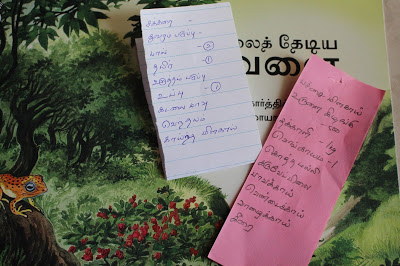What Is Your Mother Tongue’s Personality?

head.
Mandela.
You will realize how true the above words can be. So, what’s all the fuss about
one’s own language or mother tongue?! Simple. Languages and emotions go
hand in hand. One’s mother tongue language, that is the language first
introduced when in childhood is an indicator of one’s cultural identity. Hence
when spoken to or exposed to one’s mother tongue, very subconsciously, the
feeling of being at ease, at home, and a sense of belonging are re- evoked.
hundreds of native languages, how many of us, really use our mother tongue
to communicate?
parents as Amma and Appa. But, fancy me, one fine day, I decided to call my
parents as ‘Mummy’ and ‘Daddy’. Initially, our neighbours in the colony, gave
me those looks which said, ‘ooh.. she must be one modern girl!’. My mother
tried to change the Mummy to Amma, but it never worked. I remember her, in
a desperate attempt, yelling at me saying, “Even a cow which is born in
England will say maaaa, look at you, you are born in Chennai and call me
Mummy in English!” I found the example silly and irrational, then. Logic
blinded the emotion associated with her nagging to call her Amma and not
Mummy. Today, as a mother of an extremely preoccupied teen whose
conversations are studded with words like cool, super, awesome, hot, s*** etc.
the sentences begin with Maa and end with another Maa. There is a certain
warmth that fills my heart. I do understand why my mother wanted to hear a
maa from me and not a mummy.
difficult, I enjoyed everything about it. Ilakkanam (grammar) and illakiyam
(literature). But, I was’nt able to immerse in the sheer beauty of the language.
Because, I was in the race. I had to sustain my first place, right! ‘First rank’ ~
my elixir. Then came a time, I won the first prize for a story that I wrote in
Tamizh. And the prize was a thin , unattractive book. A book of poems , by the
then new-age poet Vairamuthu. Tamil poetry became my first love. Gradually, I
began to see the hidden beauty in my mother tongue. Was it the language or
my connect with the language which helped me appreciate it better? Well, I’ll
never be able to answer that.
forgetting ‘the reading and writing part’ of Tamizh, I take my sweet revenge!
All my grocery lists, little romantic notes, reminders …I make sure to write
them in Tamizh. Though he might struggle to read them, I know, I am doing my
bit for my mother tongue. His mother tongue.
pre-primary years, follow the mother tongue approach. Children are
introduced to the language not through the reading, writing, the mundane ‘a
for apple, b for ball’ way, but just like how a mother tongue is introduced at
home. Through casual conversations, simple songs ~ have you observed the
blissful interactions between a mother and her child…then you’ll understand
what I mean. It’s not just the language, it’s the way the language is introduced
which also makes one’s mother tongue even more special.
proverbs, riddles, poems etc. from different regional languages into my story. I
never to fail to ask my audience what a particular word in the story would be in
their mother tongue, for eg. what would a tree be called in their mother
tongue ? Though I realize many blank faces may look back at me, I know, that
the question would work as a trigger to go home and ask their parents or
grandparents what a tree was called in their mother tongue. Also, I give simple
reminders to take pride in developing literacy in our mother tongue languages.
Rawlings, a famous polyglot (a person who knows and is able to use many
languages) said in one of his interviews, ‘Every language has a personality.
There are languages that make you confident, there are ones that make you
feel shy’. Well, I am not quite sure whether I believe in those words
completely, but, I know, languages .. especially, mother tongue languages and
emotions go hand in hand. So, here’s my question for you, what’s your mother
tongue’s personality?










